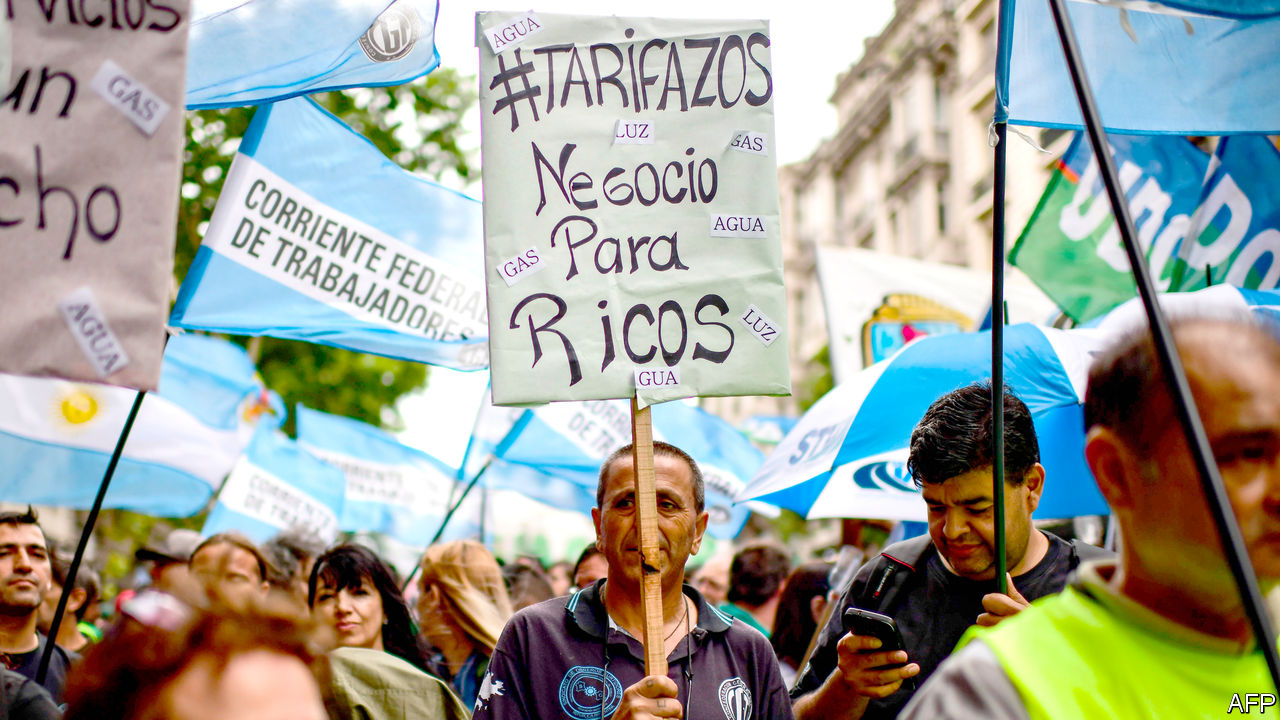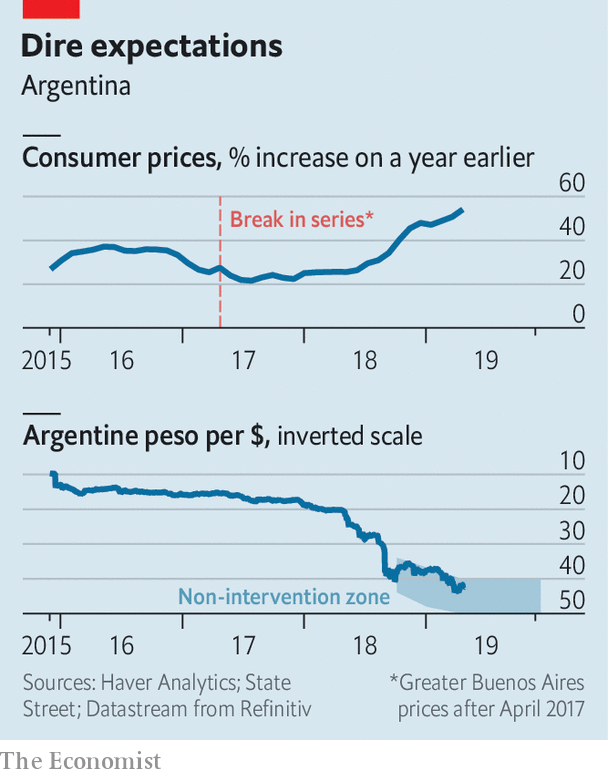Mauricio Macri emulates his rival, Cristina Fernández de Kirchner
A populist is a liberal mugged by inflation

“I JUST WANT an end to the price madness,” says Sonia Valverde, a mother of three, at a supermarket in Buenos Aires. She points to a government sticker advertising new price controls, which have frozen the price of 64 products, including sachets of milk. The only difficulty is that no sachets remain on the shelf.
Ending Argentina’s price madness was Mauricio Macri’s guiding mission when he won the presidency in 2015. He lifted currency controls imposed by his populist predecessor, Cristina Fernández de Kirchner, and began to cut energy subsidies. He gave the central bank a target for inflation and let the statisticians measure it honestly. And he loosened price controls Ms Fernández had imposed on hundreds of items, including soap and chicken.
But Argentina’s maddening prices refuse to be tamed. When inflation fell less quickly than hoped, the government relaxed the central bank’s inflation target in late 2017, undermining its credibility. As American Treasury yields rose months later, the peso dropped and inflation soared. Argentina embraced the IMF and abandoned its inflation target in favour of the more direct goal of constraining the money supply. But even after the central bank promised to freeze the quantity of money until the end of this year, the peso wobbled and annual inflation soared, to almost 55% in March (see chart).

Mr Macri’s popularity is headed in the other direction. An opinion poll last week suggested he would lose October’s election to Ms Fernández, despite corruption charges against her. To defeat her, Mr Macri has chosen to emulate her, demanding that shops refrain from raising “essential prices” for six months. In a meeting with supermarket bosses, he insisted that he would win by 52% to 48%—the kind of thin margin that makes retailers nervous.
“Such agreements over prices will never solve the real problem: never have, never will,” says Miguel Acevedo, the head of the country’s leading employers association. In Buenos Aires, the freeze and other controls affect only about 3% of the consumption basket, according to JPMorgan Chase, a bank. Many of these prices jumped in the few days between the announcement and imposition of the freeze. And if any products are withdrawn from the shelves, they drop out of the inflation figures anyway.
But the controls may still have an indirect impact, through psychology and politics. Argentina’s macroeconomic policies are now consistent with lower inflation: the fiscal deficit is narrowing, interest rates are painfully high and the IMF has boosted the central bank’s foreign-exchange reserves. But inflation has its own momentum: it is high, because it was high, and is expected to remain so. The hope is that freezing some high-profile prices might help curb those expectations, at least until the election. Whereas Ms Fernández’s controls tried, unsuccessfully, to suppress the inflationary effects of loose policies, Mr Macri’s are trying to reinforce the disinflationary impact of tight ones.
That inflationary psychology also depends on the exchange rate, which Argentines watch with grim fascination. Under the country’s agreement with the IMF, the central bank can step in to defend the peso if it weakens beyond a “non-intervention zone”. This has moved slowly over time, so as to allow the peso to cheapen gradually, thus keeping exports competitive despite rising peso prices. But for the rest of the year, the central bank will strive to stop the currency weakening beyond 51.5 pesos to the dollar, whatever the damage to exports.
If the peso holds, inflation should start to fall. And if that happens, Mr Macri could yet win re-election. According to Eduardo D’Alessio, a pollster, 71% of voters approve of the anti-inflation package, which also provides credit for the poor and elderly, as well as cancelling planned increases in electricity and transport prices. But if Mr Macri’s election chances look too bleak, Argentines might resume their flight into dollars, weakening the peso, worsening inflation and thereby guaranteeing his defeat. In this way, Argentina could succumb to a self-fulfilling fear of Ms Fernández. In politics, as in economics, expectations can precipitate the dangers they foresee.
0 comments:
Publicar un comentario